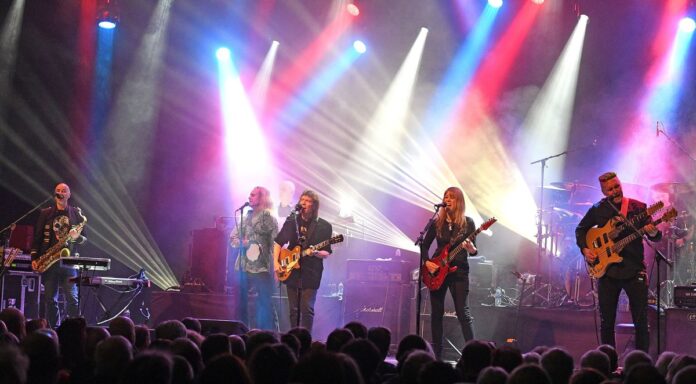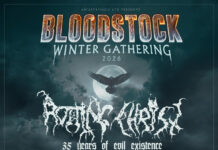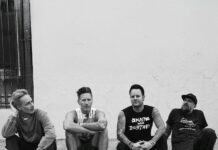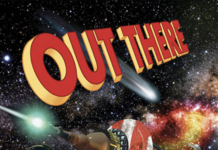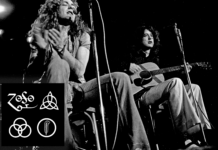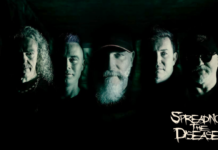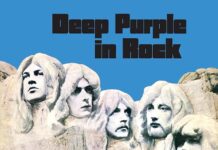In 1972 Genesis released Foxtrot, their fourth studio album and one which clearly marked a significant development in their songwriting skills and musical abilities. Songs like ‘Watcher of the Skies’ would go on to become long-time stage favourites, the quirky ‘Get ‘em Out By Friday’ showed the band tackling the issue of property developer greed, while the twenty-three-minute epic ‘Suppers Ready’ would go on to be lauded as a prog classic, even today still being voted high up in any list of all-time prog classics.
Steve Hackett was the guitarist in Genesis at the time of Foxtrot’s release, contributing to the album in no small measure, not least with his track ‘Can-Utility & the Coastliners,’ as well as some sterling guitar work. Now a solo artist, in 2022 Hackett took Foxtrot out on the road to commemorate the fiftieth anniversary of the album – and performed it in its entirety, which was something Genesis never did, and it was greeted with rapturous receptions everywhere it was performed.
Not too many albums which’re fifty years of age could achieve such a reception, especially if performed all the way through, so clearly Foxtrot has something. What did Steve think, after all this time, was the enduring appeal of Foxtrot?
“I think it’s because it’s well written, that’s the key thing,” he began. “I can’t imagine anyone wanting to come and listen to it because they’re in love with the bell bottoms we were all wearing or the bandero moustaches. No one’s gonna buy an album fifty years later just because they were in love with their favourite rock star, or if they do that’s pretty sad,” he laughed. “But I think the appeal is because it’s the music which’s endured, because any music which survives fifty years or longer has to have been good in the first place.”
It was mentioned to Steve one of the amazing things about Foxtrot was, that between January 1972 and the album’s release date on October 6th, Genesis played around 125 gigs as well as recording the album. Were the band under any pressure to rush-record the album, given all the gigs?
“I think the album was recorded much more piecemeal. I remember, when we recorded Nursery Cryme in 1971, we literally took the summer off to record the album, but this one was different because, at this point, we were a hard-working act and were getting busier and busier, so it had to be recorded in stages. I hadn’t finished doing guitar overdubs on the end of ‘Suppers Ready,’ so I flew back from Italy while the others came back by road, as I had to finish because everyone else had done their bit, so I had the studio to myself and went to town on it. So, as mentioned, it was done piecemeal, but it’s often a good way to work because you get the chance to reflect on what’s been done, and what does it really mean and what’s this thing all about?”
“When it’s finished, then there’s playing it ‘live,’ which is something the band then never did in its entirety, we just played selective cuts from it. But, all these years later, Foxtrot’s so well known, I can take a chance of performing it in its entirety, which means I can do the Cinderella tracks, like ‘Timetable’ and ‘Horizons,’ which are easy to overlook because Genesis didn’t play them back in the day, they just did selected tracks. There’s also ‘Can-Utility and the Coastliners,’ which I tried playing in Italy but it didn’t work, so I binned it, and considered it to be too difficult, but I’ve played it since and it’s one of the best tracks and goes down well, so I’m pleased to be able to play the whole album in its entirety.”
I suggested to Steve Foxtrot was a very brave statement to make as, at the time, Genesis was still a band in search of its audience.
“That’s right, we were,” he agreed. “At the time, Genesis was still a band very much in search of an audience, and we were just in the transition of switching from a straight ‘live’ show to being able to do something with our own light show and effects and going much more theatrical, so that made the difference. The presentation then came on in leaps and bounds, and suddenly there was an audience there to support it, which was really important for us.”
Foxtrot, for this writer, was also the album which demonstrated just how much Genesis had improved from their previous album, both as musicians and songwriters. What was Steve’s take on this?
“I think so, yeah,” he agreed. “I think the playing improved on this album from the previous one, and I think it went on to improve subsequently. That’s the beauty of being a better player now, to be able to do things I could only have dreamt of back then, with technology, personal technique and the band.”
“I mean, I’m from an era when John Lennon considered Genesis to be the true sons of the Beatles .. praise from Caesar indeed! I was very happy with that. I mean, I’ve had my heroes over the years, and Lennon’s certainly one of them. They were pointing the way, and I get the impression every band who rode in afterwards did so on the Beatles’ coattails. Before this, there was Cliff and the Shadows and I was buying guitar records, but somehow there was this quantum leap forward and music evolved as they evolved, because they had such tremendous success, they could do anything they wanted. They had the world’s ear and everybody would cooperate with them, everyone wanted to hang out with the Beatles. Everyone wanted to hear what the dream was, so I don’t quite agree with Lennon when he says, ‘the dream’s over,’ I think it lives on, as it has for Genesis, albeit in a smaller way, because no one can compete with the billions of sales they had.
Music will probably never be as important again, not in my lifetime. Obviously, it is important for me personally, but I don’t think there’re many more converts to come. Music was a lifeline and it did change the world and it got everyone, if not singing the same tune, at least listening to the same tune instead of the decoupling world we have now where everything seems to be going retrograde, so the Beatles were a real healing force. I mean, they even sang in German on one song, probably sacrilege to the old guard, but the world needed to be healed, as it does today. A world where music was so much more in the forefront than today.”
‘Shadow Of The Hierophant’ (a track from Hackett’s 1975 album Voyage Of The Acolyte) was due to be included on Foxtrot, wasn’t it? Why didn’t it make the cut?
“Yes, it was, and part of ‘Shadow ..’ was rehearsed by Genesis around about the time of Foxtrot, but in the end, I’m pleased I got to do with a team that was almost Genesis (Rutherford and Collins played it on Voyage ..), and it’s become a firm favourite of ‘live’ gigs and goes down very well. I’m pleased I was able to do it. I didn’t even need to suggest it, I just decided to do it as a crescendo, taking a leaf out of Ravel’s book.”
Did Steve and Phil Collins really come close to leaving Genesis during the recording of the album?
“Just before recording it, yes,” he agreed, “and Peter was to follow. It wasn’t always easy working in Genesis, for all sorts of reasons, including inter-band politics. I think we might have thought our futures lie elsewhere, but we were asked to stay in the band, so we did. They’d suddenly realised they liked what we did, which was rather nice.”
I suggested to Steve one great thing about Genesis at this time was they were one of the few prog bands, not only capable of writing side-long pieces but also able to perform the whole track onstage.
“Well, I’m all for revealing the truth now,” he began. “Having seen King Crimson play at the Marquee in 1969 and befriending them at the time when they were about to record Court of the Crimson King, when I was a serious wannabe,” cue laughter, “I noticed they finished up their sets with a series of pieces which were all linked together as if it were a long-form piece, but these pieces were disparate, like doing ‘The Young Ones’ bolted onto ‘Mars God of War’. You could do things like this back in 1969, but I thought there was an audience prepared to listen to these long-form pieces, put together with some atmospheric links, and I thought if we could record it, and then perform it in its entirety, with all the bells and whistles, and we could do it with a mellotron and light show, and effects appearing out of nowhere.”
“Peter Gabriel and I put our foot down and said we’re not going to perform this unless it’s got everything going for it because it’s got to test the audience’s patience and it’s an opportunity to test their imagination. So we won this battle .. we didn’t win every battle with the band but we won this and it became a mainstay of the ‘live’ shows which followed, and it seems to be the favourite prog track of all time, if Prog magazine is to be believed!”
Mike Rutherford stated, “when Genesis were in the process of recording ‘Suppers Ready,’ they had no idea what they were doing.” Is this a view Steve subscribes to?
“I think Mike’s awfully keen to dismiss anything which happened pre-MTV favouritism,” he came back with. “I think I’d counter this by saying, at the time when John Lennon gave an interview, saying Genesis were the true sons of the Beatles, this is all pre-MTV stuff, around the time of Foxtrot and Selling England By The Pound, so I don’t dismiss it, and I don’t think Lennon dismissed it, so if Mike said this, then I think he’s being political and cutting off his nose to spite his face. I think, at the end of the day, it was great music, it’s survived its critics then and will survive its doubters now.”
In Steve’s view, did Genesis ever top ‘Suppers Ready’?
“I think Selling England By The Pound, combined with Foxtrot, and a few pieces from the previous album, then you’d have pretty much all my favourites, though of course other albums did have some really good tracks, but somehow I feel, if you’re looking for whole albums and say this is worth listening to from beginning to end, it’d probably be those two, as they maintained a comparable standard.”
I mentioned to Steve Selling England is up there in my list of the ten albums I would take to a desert island.
“Well, there’s a lot to recommend it, isn’t there?”
I agreed there was, stating I was lucky enough to see Genesis performing it at the time of its release.
“I remember the gig at the Rainbow (London) in 1973, we were just starting to crack it then, I think. That night, someone shouted out ‘Genesis are the greatest band in the world’ at the beginning when the mellotron started up, and Richard McPhail, who was mixing the sound out front, stated to us after, ‘and at that moment, you were!”
In the pantheon of lengthy prog epics .. ‘Close To the Edge,’ ‘A Plague Of Lighthouse Keepers,’ ‘Nine Feet Underground,’ etc, .. where would Steve place ‘Suppers Ready’?
“I think the trouble is .. I was instrumental to putting it all together. I suggested the long-form thing, and I came up with some sections and ideas, so it’s difficult for me to say it’s better than that bands effort over there. I don’t know, I just think it’s a great British song and the perfect length for a hit single.”
When Steve first came up with the idea of studio album Genesis Revisited, did he ever imagine it’d be as successful as it’s become?
“To be honest, I didn’t, no. I certainly didn’t think we’d be playing the Albert Hall doing it,” he admitted. “John Giddings, the Genesis agent, reminded me when I took the idea to him that, when he was social secretary at Exeter University, the very first band he booked to play there was Genesis! He even remembered what he paid us .. so when I took the idea to him, he loved the idea of it being reborn from the ground upwards again, and he’s also a guitar fan. So, yeah, I’m very happy he took it on and stayed with it, because it’s given me the chance to do Genesis greats again, as well as other things of my own added on, because otherwise things like ‘Shadow of the Hierophant’ might get a little glossed over, but it gives me a platform to do some personal favourites.”
I mentioned my view was what’s helped make the Genesis Revisited series so good is the fact Steve’s surrounded himself with absolutely top-notch musicians plus a great vocalist in Nad Sylvan.
“Yes, Nad is a great singer, isn’t he?” he enthused, “and the musicians are all top-notch, they’re capable of being a top band in their own right. Yeah, they are fantastic individually, each is stunning in their own way. They each carry a world of music and they all have their own muse and they’re still developing. Amanda (Lehman, guitar and vocals) has released one album and she’s also on something I’ve been working on recently, and there are comparisons with Clannad the way she’s been sounding with her increased vibrato. As I said on the ‘live’ DVD, girls can play as well, which is important to me, that prog isn’t just all guys of a certain age, that there’re women involved, both in the audience and embracing it from within the ranks.”
With Genesis Revisited, are there any plans to reprise either Nursey Cryme or Trespass?
“Oh, my goodness,” he laughed. “Trespass was before my time with the band, and as much as I like several of the tracks on it, mainly written by Anthony Phillips, my predecessor in the band, Nursery Cryme might be more of a contender. I know next year is the 50th anniversary of The Lamb, so I’m going to do some selections from this one, some of the highlights from it. Whether or not doing whole albums has a future, as I’ve covered most of them, I think it’s probably a case of cherry-picking across the best of it, and also solo material, getting braver with it. But I’m happy to be taking Foxtrot to the United States as they haven’t heard it in its entirety either, and it’s been going down well across the rest of the world, playing it relentlessly, though we haven’t taken it to Japan yet but I’m hoping to. We’ve got three months of touring Foxtrot in America coming up.”
We ended an enjoyable chat by me throwing a mild curveball, and asking Steve if he remembered playing ‘the six bob tour’?
“Yes, I do, yes, I remember it very well as it was the first professional gigs I ever did with Genesis, we were pitched into it almost immediately, playing to sold-out town halls and universities right across Britain. It was a good idea by Tony Stratton-Smith to do this, putting three bands on the same bill and all for the price of fish and chips. I know Stiff Records, later on in the seventies, did something similar, Reg Colson, who was the bother of Gail Colson, who was at Charisma, got together some acts in the punk era and it gave them all a push. It was a good thing to do as well.”

